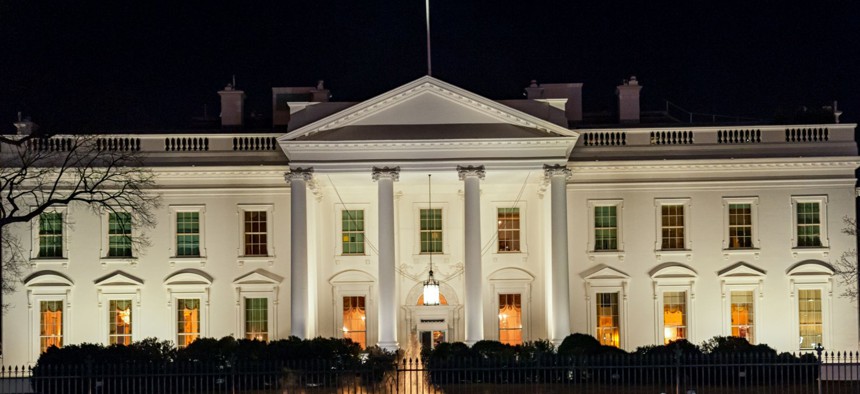White House Suggests Feds Could Crack Down on Recreational Pot

Shutterstock

Connecting state and local government leaders
“I do believe that you’ll see greater enforcement,” press secretary Sean Spicer said Thursday.
With recreational marijuana use now legalized for adults in eight states, White House press secretary Sean Spicer on Thursday raised the possibility that the U.S. Department of Justice under President Trump could ramp up enforcement against the drug.
Asked if the federal government would take action related to recreational marijuana in states where it is legal under state law, Spicer replied: “Well, I think that’s a question for the Department of Justice.” But then he added: “I do believe that you’ll see greater enforcement.”
Pressed later to clarify what he meant, Spicer said the Justice Department “is the lead on that. It is something that you should follow up with them, but I believe that they are going to continue to enforce the laws on the books with respect to recreational marijuana.”
Spicer stressed that Trump sees a distinction between medical and recreational marijuana.
“I’ve said before that the president understands the pain and suffering that many people go through who are facing especially terminal diseases and the comfort that some of these drugs, including medical marijuana, can bring to them,” Spicer said.
“There is a big difference between that and recreational marijuana,” he added.
Reached by phone, the Department of Justice public affairs office was unable to immediately provide a statement following up on Spicer’s remarks. The department had not responded to a subsequent email with questions about marijuana enforcement by late Thursday evening.
At one point, Spicer linked marijuana to problems with opioid addiction that have afflicted parts of the U.S. After mentioning opioids, which include drugs like prescription painkillers and heroin, he said: “the last thing that we should be doing is encouraging people.”
Ballot initiatives voters approved in 2012 enabled Washington and Colorado to become the first states to create systems allowing for legal retail sales of recreational marijuana.
Sales began in Washington in 2014. In the last fiscal year, taxable retail sales of recreational pot there totalled $461 million, according to state Department of Revenue figures. In Colorado, combined sales of recreational and medical marijuana reportedly cleared $1 billion last year.
Voters in California, Maine, Massachusetts and Nevada all approved measures in 2016 clearing the way for adult use of recreational marijuana, according to the National Conference of State Legislatures. Legalization measures passed in 2014 in Alaska and Oregon.
Medical marijuana is now allowed in 28 states and the District of Columbia, based on information published by the National Conference of State Legislatures.
Marijuana remains illegal under federal law.
Tara Lee, deputy communications director for Washington Gov. Jay Inslee’s office, said in an email that Spicer’s remarks “don’t change our position on legal marijuana, as passed by Washington state voters in 2012.” She also forwarded a letter that Inslee and Washington state Attorney General Bob Ferguson sent to U.S. Attorney General Jeff Sessions on Feb. 15.
In the letter, Inslee and Ferguson ask to meet with Sessions to discuss the Department of Justice’s position on state laws legalizing marijuana.
They also request that the department maintain guidance concerning marijuana enforcement outlined in the so-called Cole Memorandum, or consult with states before making any changes.
Authored by former Deputy Attorney General James M. Cole in 2013, the memorandum explains that if states set up strong regulatory systems for marijuana, which adhere to certain federal priorities, then law enforcement efforts related to the drug will be largely left to state and local authorities.
Some of the federal priorities include preventing the distribution of marijuana to children, ensuring revenues do not go to criminals and keeping pot from moving across state lines.
The memorandum cautions that if states fall short meeting these guidelines, the federal government may seek to challenge marijuana regulatory systems, or to take “individual enforcement actions,” including criminal prosecutions.
“We recognize that a new Attorney General may reconsider the policies of his or her predecessors,” the letter from Inslee and Ferguson to Sessions says. “We respectfully submit, however, that the best choice at this time is to leave the Cole Memorandum in place.”
Lee said Thursday that the governor’s office had not received a response to the letter.
Ferguson issued a statement Thursday that said he was "deeply disappointed" to hear Spicer's remarks. "My office will use every tool at our disposal to ensure that the federal government does not undermine Washington's successful, unified system for regulating recreational and medical marijuana," he added.
Inslee and Ferguson are both Democrats.
In an emailed statement, Mark Bolton, marijuana adviser to Democratic Colorado Gov. John Hickenlooper, said: “It would be premature to speculate on what the administration may or may not do.” He added: “We have worked with the Department of Justice since legalization to develop a framework that respects voters and promotes public safety.”
Sessions’ previous comments indicate he is not a fan of pot.
At a Senate hearing last April he said: “we need grown-ups in charge in Washington to say marijuana is not the kind of thing that ought to be legalized, it ought not to be minimized, that it’s in fact a very real danger.”
Bill Lucia is a Senior Reporter for Government Executive’s Route Fifty and is based in Washington, D.C.

NEXT STORY: Mayors to Congress: We Need to Be a Part of the ACA Conversation





